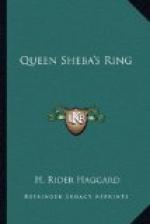As finally arranged this was the order of our march: First went an Abati guide who was said to be conversant with every inch of the way. Then came Orme and Sergeant Quick, conducting the camels that were loaded with the explosives. I followed in order to keep an eye upon these precious beasts and those in charge of them. Next marched some more camels, carrying our baggage, provisions, and sundries, and finally in the rear were the Professor and Shadrach with two Abati.
Shadrach, I should explain, had selected this situation for the reason, as he said, that if he went first, after what had passed, any mistake or untoward occurrence might be set down to his malice, whereas, if he were behind, he could not be thus slandered. On hearing this, Higgs, who is a generous soul, insisted upon showing his confidence in the virtue of Shadrach by accompanying him as a rearguard. So violently did he insist, and so flattered did Shadrach seem to be by this mark of faith, that Orme, who, I should say, if I have not already done so, was in sole command of the party now that hostilities were in the air, consented to the plan, if with evident reluctance.
As I know, his own view was that it would be best for us four Englishmen to remain together, although, if we did so, whatever position we chose, it would be impossible for us in that darkness to keep touch with the line of camels and their loads, which were almost as important to us as our lives. At least, having made up our minds to deliver them in Mur, we thought that they were important, perhaps because it is the fashion of the Anglo-Saxon race to put even a self-created idea of duty before personal safety or convenience.
Rightly or wrongly, so things were settled, for in such troublous conditions one can only do what seems best at the moment. Criticism subsequent to the event is always easy, as many an unlucky commander has found out when the issue went awry, but in emergency one must decide on something.
The sun set, the darkness fell, and it began to rain and blow. We started quite unobserved, so far as we could tell, and, travelling downward from the overgrown, ruined town, gained the old road, and in complete silence, for the feet of camels make no noise, passed along it toward the lights of Harmac, which now and again, when the storm-clouds lifted, we saw glimmering in front of us and somewhat to our left.
In all my long wanderings I cannot remember a more exciting or a more disagreeable journey. The blackness, relieved only from time to time by distant lightnings, was that of the plagues of Egypt; the driving rain worked through the openings of our camel-hair cloaks and the waterproofs we wore underneath them, and wet us through. The cold, damp wind chilled us to the bone, enervated as we were with the heat of the desert. But these discomforts, and they were serious enough, we forgot in the tremendous issue of the enterprise. Should we win through to Mur? Or, as a crown to our many labours and sufferings, should we perish presently on the road? That was the question; as I can assure the reader, one that we found very urgent and interesting.




